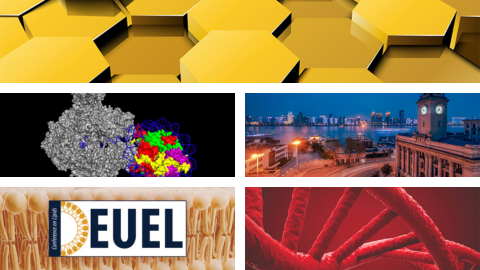How to get and keep a handle on the literature in your field
The job of a researcher has many parts. There is, of course, carrying out experiments in the lab or on the computer. Equally important, or maybe even more important, is having an understanding of the literature in your field. That’s the place where all the experiments come from.
I had a mentor once who told me that reading should be 80% of your effort in grad school, while the experiments should only be about 20%. That way you know you are doing the right experiments based on a good foundation. While everyone has a different idea for that ratio of importance, we all know that doing experiments without a good foundational knowledge in the field is a waste of time.

If you’re starting out in a lab, getting a handle on a field of literature can be daunting. There often isn’t a central source of all the important information in a field — no textbook, for example, on your particular protein or pathway — so this means you have to build your own stock of knowledge. Sometimes there’s so much info out there (a Pubmed search for “mTOR,” for example, brought back more than 36,000 papers) that it’s hard to know how and where to start.
If you’ve been in a field for a while and know all the basics, you still have the task of keeping up to date with developments.
Both these tasks sometimes feel overwhelming, so I surveyed scientists in various positions at different institutions and asked them how they got — and keep — a handle on the relevant literature.
They shared with me where they look for and how they manage relevant information. They also talked about the skills and techniques they use.
Tools and resources
Conferences: If you have the opportunity to attend a conference in your field, even if you don’t present, that can be helpful at any stage.
In the beginning, it’s helpful to get a sense of the field and to get used to the vocabulary, the main players and the big questions. I was lucky enough to attend a conference during the first year I was in my grad school lab. It felt like getting a crash course in the field, and helped me get up to speed.
Later on, conferences keep you up to date and help you see what direction people are moving in. Sam Schilit, a clinical laboratory genetics fellow at Harvard University, said, “Conferences are a great way to get a pulse on the direction of the field, especially because many presentations show new data without waiting for the lengthy publication process.”
Review articles and their citations: Review articles are an excellent place to start learning a new field. It’s as close to a textbook as most fields have. It’s worth noting that Pubmed has an option to show only review articles in your search.
Not only are reviews a good source of facts and information, but they are a great source of references as well. If you’re new to a field and don’t know where to look, going through the references of a good review article is a solid starting point.
In a big field, like the mTOR example I used earlier, it’s helpful to use multiple keywords. For example “mTOR mouse” cuts the results by a third, while selecting “review” narrows it to a few hundred articles. Still a lot! But a number you can browse through.
Paper organizing apps and programs: Apps such as Mendeley, Zotero and Papers have some really useful features. They can collect papers, allow note-taking on papers, and create bibliographies and reference lists. Most also offer full text search, which is great if you’re like me and weeks after you’ve read a paper you want to cite the fact you remember and are left wondering “Which paper was it that showed that?”
Most organizing programs also offer a suggestions section, where the program suggests papers it thinks will be relevant to you, based on what you’ve read and saved. When Nick Giangreco, a Ph.D. student at Columbia University, was first starting in his lab, he said, “I would read/skim articles in my ‘Read Next’ section in my Mendeley app. I did this daily for a few years. Took about 30 minutes every day.”
Email alerts from databases: Something most useful after you’ve gotten your basics covered and want to stay up to date is the email alert. “I use weekly Pubmed searches. You can have it run the same search automatically and email the results,” said Theresa Swayne, who manages the confocal microscopy core at Columbia. “I like the Pubcrawler service from Trinity College Dublin, but regular Pubmed now does the same thing.”
Other sources of alerts include Google alerts and Embase (the Elsevier database).
Weekly journal emails and digests: Another way to stay up to date is to get alerts from the journals themselves. “I get emails from important journals in my field when new issues come out,” Schilit said. Journals often send out weekly emails with their table of contents or summaries of top articles. This is a great way to stay in touch with the field without having to do all the searching yourself.
These can also be helpful in determining what to focus your time on. Kumar Sarkar, a cardiologist at Jefferson Health, said, “I basically skim abstracts and a few key journals’ weekly bulletins and print out a few papers to read every week.”
Skills and methods
Start somewhere, and build: Don’t be deterred by not understanding things at first. Pick a starting point, such as a recent paper from your lab or a review article, and just chug through it, knowing you won’t understand all of it at first.
I sometimes think about my learning process as a net. When I start to learn anything, there’s no frame of reference in my brain yet, so info comes in and goes right out again. I’ll read papers and they fly right out of my brain. But the more I read, the more my brain builds its net of context and background, and the more it starts to catch new information. A review the first time I read it might sound like gibberish, but after I’ve read a few other articles my net starts to form, and when I try to read that review again, I can catch some of it.
Read references: It’s essential to know what each paper is building on. One way to do this is by reading the main papers referenced in the paper you’re working through. You can save these in your citation-managing program to read later if you want to keep your focus on the paper at hand.
Keep a schedule: The exact schedule matters less than having one. Reading articles every night in bed, as one PI described, or every day over breakfast, are at one end of the spectrum; skimming some abstracts regularly is at the other end; and setting aside one afternoon a week is somewhere in the middle. The amount of information out there is incredible. But you can make a dent in it if you commit to something — even a tiny commitment, such as an abstract a day.
Skim a lot, and thoroughly read a few: Many people mentioned that they skim many abstracts and then pick just one or a few papers to read in depth. Schilit mentioned that when she’s keeping an eye on new literature, “I mostly review abstracts and then dive deeper into the text if it’s information I need for my research.”
Print some papers: If it helps you to remember the information, print out some of the key papers and mark them up.
Take notes: People’s note-taking habits vary a lot — from a running list of definitions to a binder full of cross-referenced data on every protein from every paper you’ve ever read. Do what works for you, but do take notes.
Enjoy reading ASBMB Today?
Become a member to receive the print edition monthly and the digital edition weekly.
Learn moreFeatured jobs
from the ASBMB career center
Get the latest from ASBMB Today
Enter your email address, and we’ll send you a weekly email with recent articles, interviews and more.
Latest in Careers
Careers highlights or most popular articles

Upcoming opportunities
Putting ASBMB conferences on your radar! Plus: Award nominations are due Friday.

Retiring a research lab
Careers columnist Courtney Chandler talks to Art Spector, a former principal investigator, about making a graceful exit from the bench.

Calendar of events, awards and opportunities
Nominate colleagues for the ASBMB annual awards and your favorite molecule for our inaugural contest!


Let’s make ASBMB awardees look more like BMB scientists
Think about nominating someone outside your immediate network.

Calendar of events, awards and opportunities
It's time to vote in the society's election, and time's running out to nominate colleagues for the ASBMB annual awards.

